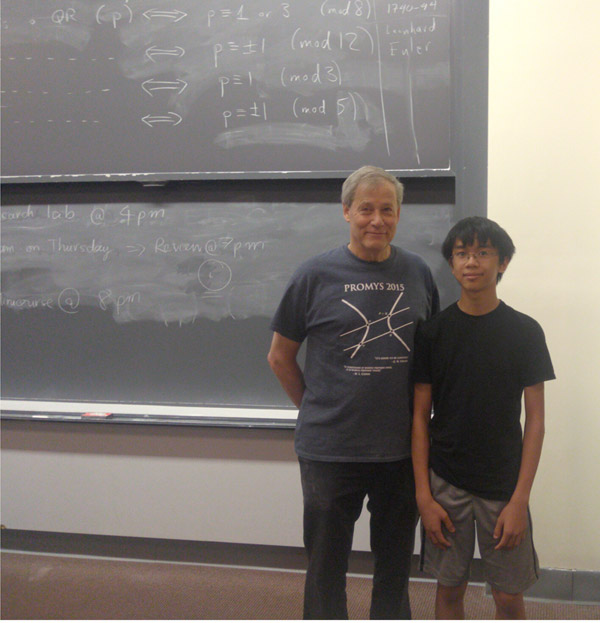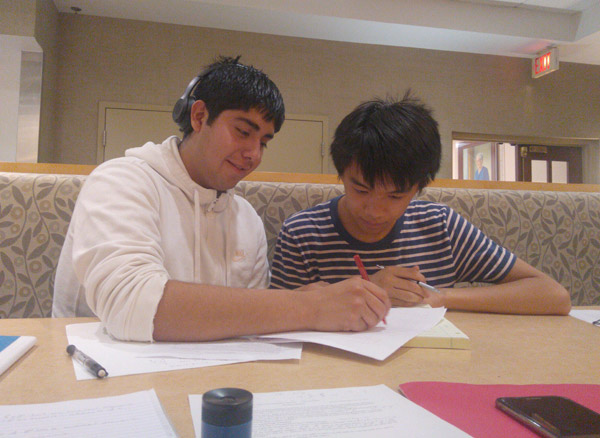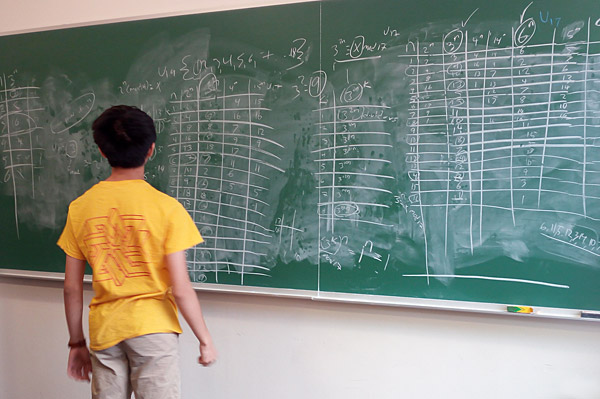by Charlie Du
This summer, thanks to support from the Garwin Family Foundation, I spent six weeks at the Program in Mathematics for Young Scientists at Boston University. The program accepts about 80 first years and 20 second years from all around the world. The primary focus of the camp is Number Theory, but there were also advanced classes for Algebra, Probability, and Zeta Functions (More advanced Number Theory).
Daily Lecture
Every weekday, we would go to morning lecture at 9 AM. There, we would have one of two instructors. Dr. Glen Stevens for the first two weeks, and the last week. And Dr. Henry Cohn for the middle three weeks. The first week, we discussed the properties of the integers with one small catch. We weren’t allowed to assume anything. If we couldn’t prove a property to be true, we weren’t allowed to use it to solve problems. By the second week, we started applying the properties that we found to different rings, or sets of numbers. In the third week, Dr. Stevens went to Oxford to get PROMYS Europe started. In the time before our midterm at the end of the week, Dr. Cohn taught us about continued fractions, cyclic units, and diophantine equations. After the midterm, the difficulty of the math ramped up significantly. The fourth week was when all the secrets of the midterm were revealed. These “secrets” consisted of a series of tricks that trivialized almost all of the midterm. Finishing that, we talked about quadratic reciprocity for the next two and a half weeks. There were a ton of interesting proofs, that I don’t think I would have ever figured out myself. The last day of lecture, Dr. Stevens gave us the “open door” problem set: A set of problems to keep us busy throughout the next year (Or 1000 because one of the problems on the set was a millennial problem).
The Rest of the Time
Lecture was exactly 90 minutes every day. The rest of the time was usually free for the students. For me, most of this time was spent working on problem sets. During the week, when I wasn’t working on problems, I played card games, frisbee, and soccer. Every Friday, the counselors would organize an activity “so mandatory, yet so fun, hence the name Mandatory Fun.” These activities ranged from “icebreakers”, Game night, Movie night, Talent Show, and more. These activities, although silly, were a great way to get to know everyone. The weekends were usually empty, so students could plan their own activities. For the first four weeks, however, there were intense training sessions for the PROMYS vs. Research Science Institute (RSI) Ultimate Frisbee game. The training proved to be useful as we only lost by two points (Historically, PROMYS has always lost by seven points or more).
The People
In my opinion, the best part of the PROMYS experience is how cohesive the community is. There is a strong sense of culture, whether it be stealing mattresses, playing “Assassins”, or not sleeping on the last day of camp. Each of these activities were passed down to the first years by second years and counselors. This strong sense of community encourages hard work and collaboration. No matter the time, there was always someone working in one of the study lounges. No matter the question , there was always someone willing to answer it.
Final Thoughts
My experience at PROMYS is something that I will never forget. All the teachers were so encouraging. This in it of itself was a huge help. Every problem set was designed to be thought-provoking and nontrivial. Whenever I got frustrated, my counselor would give me a tiny hint to help me solve the problem. While that’s great, solving the problem was never the end goal. My counselor would push me to think deeper about the implications of the solution. However, my individual success entirely hinged on the people around me. Without my friends at PROMYS, I would never have had the chance to experience even half of what I did.
Thank you for this wonderful opportunity, GFF!




